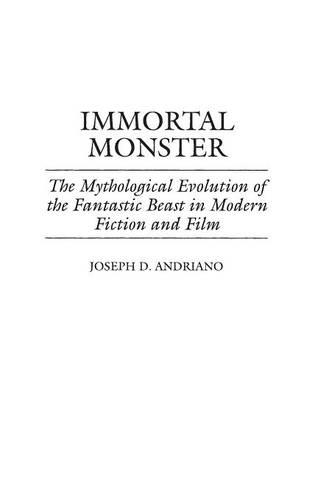
Immortal Monster: The Mythological Evolution of the Fantastic Beast in Modern Fiction and Film
(Hardback)
Publishing Details
Immortal Monster: The Mythological Evolution of the Fantastic Beast in Modern Fiction and Film
By (Author) Joseph D. Andriano
Bloomsbury Publishing PLC
Praeger Publishers Inc
30th January 1999
United States
Classifications
Tertiary Education
Non Fiction
Literary studies: fiction, novelists and prose writers
Film history, theory or criticism
813.087609
Physical Properties
Hardback
200
Description
Imaginary beasts have figured prominently in literary works ever since the ancient world, when these myths were first formulated. But the nineteenth century witnessed the rise of science, the discovery of geological findings that challenged the biblical myth of creation, and the birth of Darwin's theory of evolution. Since then, monsters have evolved from supernatural creatures to natural ones endowed with exceptional size, strength, or intelligence. This book explores both literary and cinematic texts that are especially explicit in their Darwinian portrayal of monstrous beasts, though these creatures retain an archaic mythological quality. The myth of Leviathan and Behemoth, for instance, is as central to Jaws as it is to Moby-Dick; indeed, Jaws inherits the myth directly from Moby-Dick, as does King Kong. These and other monster tales, such as The Creature from the Black Lagoon and Grendel, keep the ancient myth alive and relevant by recasting it in the context of biological and cultural evolution. There is a pattern of alternating bestialization and anthropomorphism in many monster tales, suggesting that these images are being displayed in repeated attempts to define who we are in relation to animals. Thus the more beastly the monster, the more insistently we erect the old paradigm of the Ladder of Being, placing ourselves on a higher and separate rung; but the more human-like the creature, the more readily we shift to the paradigm of the Tree of Life, in which all creatures are more closely related. Since the matter of distinctions between species also involves questions of race, the monster myth is often conscripted to serve racist agendas. But more often than not, the myth has an anti-racist subtext that undercuts the hierarchy. The closing chapters of the volume consider the notion of artificial evolution in works such as The Island of Dr. Moreau, and human-machine interaction in Gravity's Rainbow. As fables of identity, monster tales dramatize our anxieties and fears about our own animal nature and provide a means of coming to terms with our evolution.
Reviews
[A]ndriano captures the ambivalence of the monster, savage and civilized, as it exists near and within humanity. He explains his own evolutionary scriptures with passion of a true believer and contributes a provocative study for bridging the worlds of science and popular culture. He should be applauded for even trying to frame and figure the mortal asymmetry of such fantastic beasts.-Choice
[T]his is an enlightening work that helps the reader understand the evolution of monsters in literature and film and their relationship to the humans who created them, either in myth or fiction.-Extrapolation
Immortal Monster offers enough new insights and intelligent readings to make it easily worth the attention of anyone interested in the etiology of pop-culture monsters.-Science Fiction Studies
[I]nformative and entertaining.-Science Fiction Chronicle
[I]nformative and entertaining.Science Fiction Chronicle
"Andriano captures the ambivalence of the monster, savage and civilized, as it exists near and within humanity. He explains his own evolutionary scriptures with passion of a true believer and contributes a provocative study for bridging the worlds of science and popular culture. He should be applauded for even trying to frame and figure the mortal asymmetry of such fantastic beasts."-Choice
"Informative and entertaining."-Science Fiction Chronicle
"This is an enlightening work that helps the reader understand the evolution of monsters in literature and film and their relationship to the humans who created them, either in myth or fiction."-Extrapolation
"[I]nformative and entertaining."-Science Fiction Chronicle
"[T]his is an enlightening work that helps the reader understand the evolution of monsters in literature and film and their relationship to the humans who created them, either in myth or fiction."-Extrapolation
"Immortal Monster offers enough new insights and intelligent readings to make it easily worth the attention of anyone interested in the etiology of pop-culture monsters."-Science Fiction Studies
"[A]ndriano captures the ambivalence of the monster, savage and civilized, as it exists near and within humanity. He explains his own evolutionary scriptures with passion of a true believer and contributes a provocative study for bridging the worlds of science and popular culture. He should be applauded for even trying to frame and figure the mortal asymmetry of such fantastic beasts."-Choice
Author Bio
JOSEPH D. ANDRIANO is Associate Professor of English at the University of Southwestern Louisiana. He is the author of Our Ladies of Darkness: Feminine Daemonology in Male Gothic Fiction (1993), and his articles have appeared in several journals, including Poe Studies and ATQ: 19th Century American Literature and Culture. He has also published short stories in Argonaut and The Chattahoochee Review.
